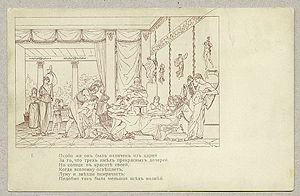- Ippolit Bogdanovich
-

Ippolit Fyodorovich Bogdanovich (December 23, 1743, Perevolochna – January 18, 1803, Kursk) was a Russian classicist author of light poetry, best known for his long poem Dushenka (1778).
Contents
Biography
Coming from a noble Ukrainian family, Bogdanovich studied in the Moscow University until 1761. His literary career started two years later with editing a literary journal. In 1766, he joined the Russian embassy in Dresden as a secretary. Three years later, he was back in Saint Petersburg, where he edited the only regular official newspaper, the Vedomosti, between 1775 and 1782. In 1788, Bogdanovich was appointed Director of State Archives, a post which he treated as a sinecure, translating Voltaire, Diderot, and Rousseau at loose hours.
It was in 1778 that Bogdanovich brought out his only work of lasting fame, Dushenka. This long poem, resembling a mock epic, was a reworking of La Fontaine's Psyche, a subject originating from Apuleius but ingeniously stylized by Bogdanovich as a Russian folk tale. The definitive edition followed in 1783 and instantly became popular for its mildly scurrilous passages. La Fontaine's conventional heroine was presented by Bogdanovich as "a living, modern girl from a gentry family of the middling sort".[1] Following the publication, Bogdanovich was recognized as the foremost Russian practitioner of light poetry and gained admission into the literary circle of Princess Dashkova, while Catherine II of Russia engaged him to write several comedies for her Hermitage Theatre.
Assessment
By 1841, Bogdanovich's chef d'oeuvre went though 15 editions. Today, it is remembered primarily for Fyodor Tolstoy's Neoclassical illustrations and citations in Pushkin's works such as Eugene Onegin. Indeed, Dushenka was a major influence on young Pushkin, who avidly read the poem during his Lyceum years but later discarded Bogdanovich's verse as immature.
Nabokov summed up contemporary opinion about Dushenka in the following dictum: "The airiness of its tetrametric passages and its glancing mother-of-pearl wit are foregleams of young Pushkin's art; it is a significant stage in the development of Russian poetry; its naive colloquial melodies also influenced Pushkin's direct predecessors, Karamzin, Batyushkov, and Zhukovski.[2]
References
- ^ Charles Moser. The Cambridge History of Russian Literature. Cambridge University Press, 1992. ISBN 0-521-42567-0. Page 83.
- ^ Vladimir Nabokov. Eugene Onegin: A Novel in Verse: Commentary. Princeton University Press, 1991. ISBN 0-691-01904-5. Page 137.
External links
Categories:- Russian poets
- 1743 births
- 1803 deaths
- Moscow State University alumni
Wikimedia Foundation. 2010.

